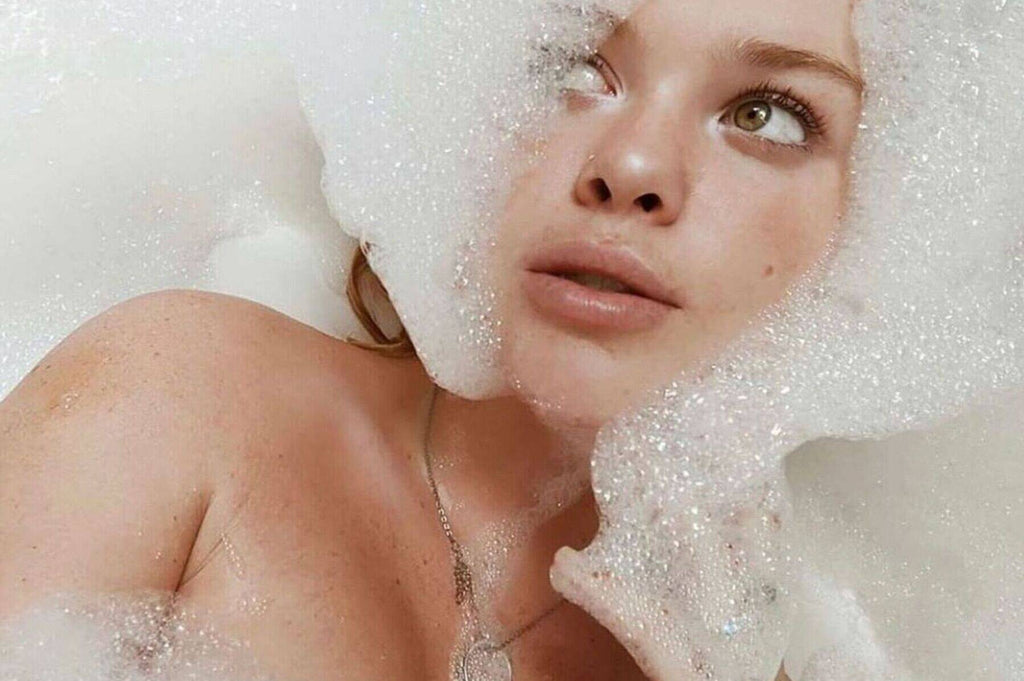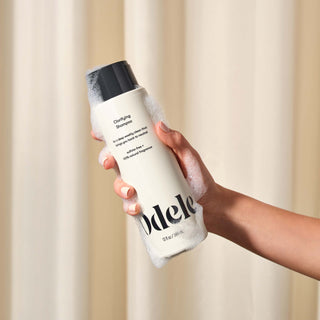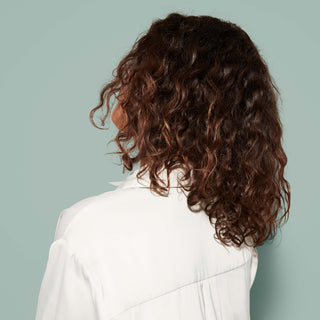Sulfates are at the top of the natural beauty no-no list, but what's behind their bad rep? There's a lot of confusion and controversy surrounding these ingredients, so we're here to clear things up. Read on to learn what sulfates are, what they do, the latest science on their safety and why we keep them out of Odele products.
What are sulfates?
Chemically speaking, sulfate is a type of salt. Sulfates is the broader term for sulfate-based ingredients used in cleansing products—the most common ones being sodium lauryl sulfate (SLS), sodium laureth sulfate (SLES) and ammonium lauryl sulfate (ALS).
Sulfates are surfactants, meaning they attract both oil and water. They’re very good at stripping away dirt and grease from surfaces, and they do so by binding to those impurities and pulling them out when rinsed off.
Sulfates are also what make shampoo super sudsy. When added to a liquid, they help reduce surface tension, creating a foamy lather that makes products easier to disperse across skin, hair and other surfaces.

What products have sulfates?
Cleansers of all kinds—from shampoos to body washes, face cleansers, toothpastes, hand soaps, dish and laundry detergents and other household cleaning products. You’ll also find them in foaming products like Epsom salts and bath bombs.
Are sulfates bad for you?
Over the years, there’s been a lot of talk about the potential health risks of sulfates—the most common claim being that they can cause cancer. But are they really as dangerous as they’re made out to be?
According to board-certified dermatologist and beauty expert Dr. Y. Claire Chang, "There is no research confirming that sulfates cause long-term harm when used in skin care or hair care products. Authorities, including the FDA and American Cancer Society, consider sulfates safe for use in cosmetics and personal care products and do not consider it a carcinogen."
In other words, sulfates are safe for human health when used as directed. That said, they do still have their downsides—let’s take a closer look.

What do sulfates do to your hair?
The biggest problem with sulfates is that they’re a little too good at their job. Squeaky clean is great for our dishes, but it’s not so great for our hair and skin. Sulfates cleanse so aggressively that they remove a lot of the good, natural oils our hair needs to stay healthy and shiny. Over time, that harsh cleansing causes stress to the hair cuticle—leaving your locks looking dull, dehydrated and frizzy. It can also fade color faster. (Rice tein is one of our favorite color-protecting ingredients, BTW.)
Sulfates are also linked with damage to keratin, the protein that makes up the hair shaft. A 2005 study found that hair immersed in sodium dodecyl sulfate lost twice as much keratin as hair immersed in water. Weakened hair proteins can lead to breakage and split ends (the worst, since the only real “cure” for these is to snip them off.) Bottom line: It's best to steer clear of sulfates if you want stronger, healthier hair.
What do sulfates do to your skin?
Though sulfates are rarely allergenic, they can irritate sensitive skin, especially the super-delicate areas around the eyes and face. They may also clog pores and cause acne flare-ups. If you must use a facial cleanser or body wash that contains sulfates, be sure to rinse it off completely and follow up with a moisturizer to prevent parched skin. (Or you could just use our sulfate-free, sensitive skin-friendly ones, designed to nourish and protect your skin's natural barrier.)
What are the environmental impacts of sulfates?
Some sulfates are derived from palm oil, a major driver of global deforestation and pollution. There’s also evidence that products with sulfates that get washed down the drain may be toxic to aquatic animals. Though many countries around the world have banned cosmetics animal testing, sadly, a lot of U.S. products with sulfates are still tested on animals to measure irritation.

What are some gentler alternatives to sulfates?
Good news is, shampoo doesn’t actually need sulfates; there are other surfactants that are gentler and just as effective. All Odele products are sulfate-free, and they still get a great lather (although, contrary to popular belief, lather doesn't necessarily equal cleansing power).
Two of our preferred sulfate alternatives are sodium lauroyl methyl isethionate (a milder, biodegradable surfactant found in our Ultra Sensitive Shampoo) and tetrasodium glutamate diacetate (a biodegradable chelating agent found in our Curl Defining Shampoo, Clarifying Shampoo and all our body washes).
Other sulfate-free alternatives to look for in shampoos, cleansers, detergents and beyond include:
sodium lauryl sulfoacetate
sodium cocoyl glycinate
sodium coco sulfate
disodium / sodium cocoyl glutamate
decyl glucoside
lauryl glucoside











